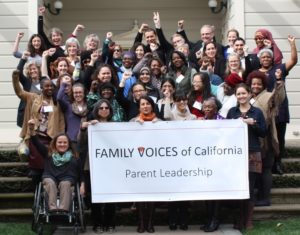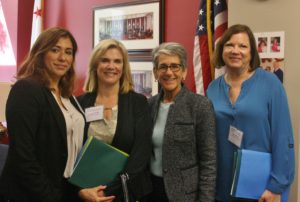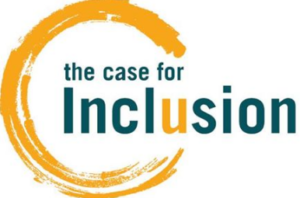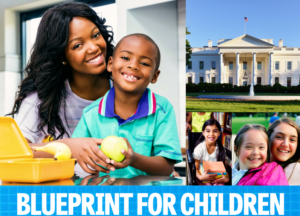This newsletter was sent October 4, 2016. If you’d like to receive our next bi-weekly digest full of a curated collection of resources, workshops, policy highlights, and action items that affect children and youth with special health care needs, please sign up here.
NEWS
FVCA Project Leadership Program Awarded 2-Year Grant To Continue Family Advocacy
We’re thrilled to share FVCA has been awarded a grant from Lucile Packard Foundation For Children’s Health to continue Project Leadership, our advocacy training program that equips families with skills to engage in all levels of public policy on behalf of children and youth with special health care needs. Project Leadership will transition into its fourth year, continuing expansion of statewide trainings as well as ongoing mentorship and support to graduates in their advocacy and leadership roles. To learn more about Project Leadership goals, click here.
Governor Brown Signs SB 586, California Children’s Services Redesign Bill, Into Law
SB 586 (Hernandez) impacts thousands of children in California with special health care needs who will be transitioning into Medi-Cal managed care plans no sooner than July 2017 under the Department Of Health Care Services’ Whole-Child Model. The state hopes this model will streamline care, and SB 586 ensures children will be protected. Governor Brown signed the bill on Sept. 25.
Related: Gov. Brown Signs Bill Allowing Fragile Children To Keep Doctors For 1 Year
Related: Sen. Hernandez’s press release announcing passage of SB 586
Registration Open For 15th Annual FVCA Health Summit & Legislative Day, Feb 27-28
Our annual Health Summit & Legislative Day brings together families, youth, providers, policymakers, advocates, and other stakeholders to identify the issues that affect children and youth with special health care needs. Join us in Sacramento for panel presentations on California Children’s Services, mental health, and more. Build relationships with families and professionals, and learn how to address legislators to implement change. Free for families, $50 suggested donation for professionals. To register, click here, and to view photos from this year, click here.
State Seeks Public Comment On Plan To Evaluate Two California Children’s Services Pilots
The Department Of Health Care Services‘ proposal for evaluating two CCS pilot programs, Health Plan Of San Mateo and Rady Children’s, is available for public comment until Oct. 19. The draft proposals are under review by the Centers For Medicare & Medicaid Services, and results of the pilots could carry weight for the future structure of CCS. To learn more and provide comment, click here.
RESOURCES
California Ranks #6 In United Cerebral Palsy’s 2016 “Case For Inclusion” Report
In United Cerebral Palsy‘s 2016 “Case For Inclusion” report, California ranks #6 (same as last year) for overall service for people with disabilities and their families. In addition, the state is one of only 15 offering family support to keep individuals with disabilities living at home, and we meet a “top-performing” 90% home-like setting standard. To read the full report and see how other states ranked, click here.
New School-Based Asthma Management Program From The American Academy Of Allergy, Asthma, And Immunology
Seeking to standardize recommendations for school-based asthma management, this program provides useful resources and includes an individualized asthma action plan. Emphasis is placed on care coordination between families, clinicians, and school nurses to improve outcomes. To learn more and read the full report, click here.
Blueprint For Children: How The Next President Can Build A Foundation For A Healthy Future
A new report from the American Academy Of Pediatrics provides recommendations for the next administration on improving the health and well-being of our kids—several of which relate to children and youth with special health care needs. A suggested policy agenda is divided into four subsections: healthy children, secure families, strong communities, and leading nation. In addition, there are separate recommendations for specific federal agencies and departments. To read the report, click here.
Melatonin And Sleep Problems In Autism Spectrum Disorder: A Guide For Parents
This toolkit from Autism Speaks provides parents with introductory information on melatonin, a common supplement prescribed by doctors to help improve sleep quality in children with autism. The guide explains why melatonin is prescribed, its associated risks, how you can tell if it’s working, and more. To download the toolkit, click here.
RESOURCE OPPORTUNITY
Individuals With Neurofibromatosis Type 1 Needed For Online Survey Participation
Researchers at the Indiana University School Of Medicine are recruiting individuals ages 5-25 (and their parents) for a study to develop a health-related quality of life instrument for NF1 to better understand and measure how the disease affects patient well-being. Participants must answer online surveys and will be given a $10 gift card for their time. For more information, email research associate Kavitha Nutakki at knutakki@iupui.edu or call 317-278-0534.
WEBINARS
October 5: Advocating For Your Child With Autism
Sponsor: SPARK
More information and registration here.
October 6: Supporting People With Disabilities To Identify Appropriate Housing
Sponsor: The Arc
More information and registration here.
October 6: Parents’ And Students’ Rights In Special Education
Sponsor: The Johnson Center For Child Health And Development
More information and registration here.
October 10: Rights And Responsibilities As A Parent Of A Child With Disabilities
Sponsor: Family Network On Disabilities
More information and registration here.
October 11: Population Health–Why It Matters
Sponsor: Children’s Hospital Association
More information and registration here.
October 12: Income And Health Inequalities And Their Relationship To Population Health Delivery Systems–Research In Process
Sponsor: Systems For Action
More information and registration here.
October 12: Idiopathic Pulmonary Fibrosis: Progression And What To Expect
Sponsor: Pulmonary Fibrosis Foundation
More information and registration here.
October 12: Environmental Toxins And Autism Spectrum Disorder
Sponsor: Autism Research Institute
More information and registration here.
October 13: Emergency Evacuation Planning For People With Disabilities
Sponsor: ADA National Network
More information and registration here.
October 13: Roles Of Families And Skills For Serving On Groups That Make Decisions
Sponsor: Statewide Parent Advocacy Network
More information and registration here.
October 14: Epilepsy And Autism Seen Through The Brain
Sponsor: Autism Speaks
More information and registration here.
October 18: How To Reach And Engage With Hispanic Communities
Sponsor: Child Trends
More information and registration here.
October 19: Prophylaxis, Teens, And Adherence
Sponsor: National Hemophilia Foundation
More information and registration here.
ARTICLES
How The ACA Is Helping Children With Special Needs And Their Families
Report: Voters With Disabilities Are Treated Like “Second-Class Citizens” At The Polls
Complex Child’s October Edition: Accessibility
East Texas Children Lose Therapy Services In Budget Cut Fallout
Governor Signs Bills To Curb Psych Drugs To California Foster Youth
For Non-English Speaking Families, Getting Health Help At School Proves Elusive
FDA Approves First Drug To Treat Rare Form Of Muscular Dystrophy
What’s ALD? A New Genetic Test Will Identify California Newborns With Disease
Young Boy’s Struggle To Survive Sparked Widespread Push For Drugs For Terminally Ill
When Should Children Take Part In Medical Decisions?
In Mental Health Care, Are We Treating The Symptom But Not The Cause?
With Little Funding And Lots Of Effort, Communities Find Ways To Combat Childhood Trauma
Medicaid Transition Causes Hardship
Texas Supreme Court Allows Medicaid Cuts To Children’s Therapy to Proceed
Children’s Mental Health Directors Face Challenges, Study Finds
Opioid Epidemic’s Youngest Victims Are A Growing Group, New Data Shows




